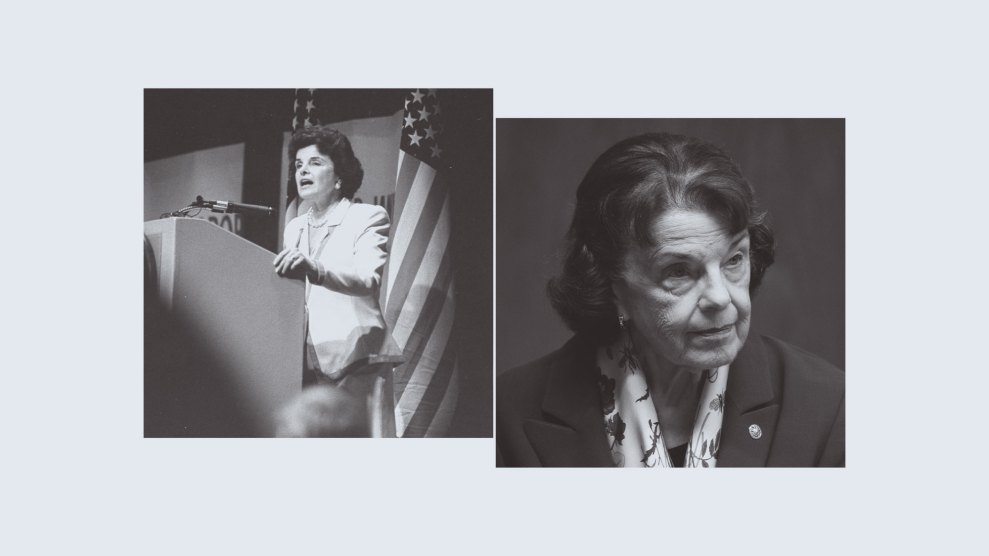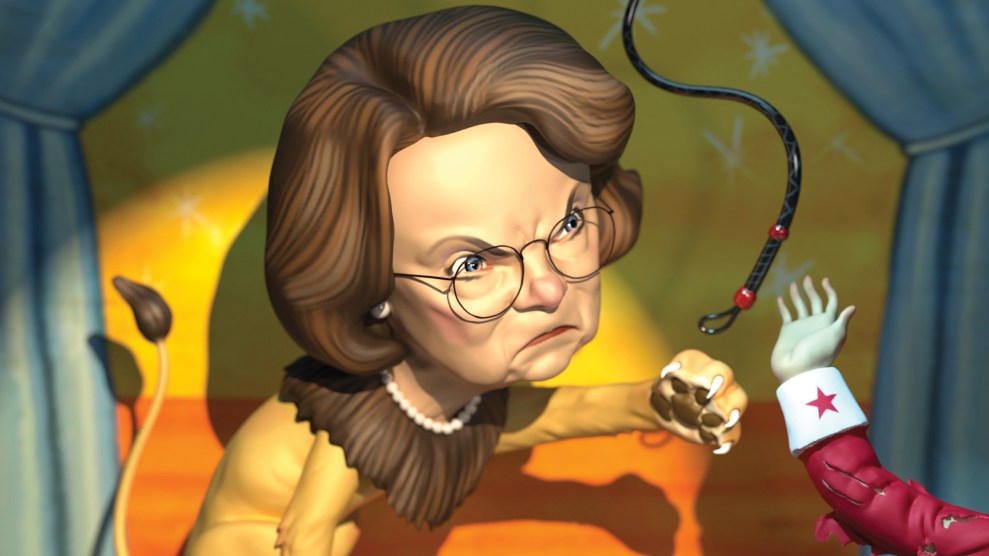
Kim Komenich/Getty; Caroline Brehman/CQ-Roll Call/via Getty
“As president of the Board of Supervisors, it’s my duty to make this announcement. Both Mayor Moscone and Supervisor Harvey Milk have been shot and killed. The suspect is…Supervisor Dan White.” —Dianne Feinstein, Nov. 27, 1978
Unlike the murders that were the catalyst for her national political career, Dianne Feinstein’s death shouldn’t have taken anyone by surprise. She was very old and very sick and for the last year the entire country had been on a death watch of sorts. Her passing is not a shock, and one of the reasons she stayed in office until the end—the possibility that Republicans could use her departure to strip Democrats of a key seat on the Judiciary Committee, enabling them to deny President Biden the ability to appoint judges and potentially even a Supreme Court justice—remains.
She had become a source of speculation and rage, a Weekend at Bernie’s punchline, and she could yet be another cautionary tale, a la Ruth Bader Ginsburg, of how aging leaders who refuse to step aside unspool their own legacy and accomplishments.
Even in this moment, when 10,000-word obits are being slapped up on front pages across America, it can be hard to remember just how historic, how symbolic, those accomplishments were. And how emblematic of the currents in San Francisco’s politics.
Feinstein became mayor of San Francisco because of assassination. Because of a workplace shooting. Because of an aggrieved white dude who saw himself as a “defender of the home, the family and religious life against homosexuals, pot smokers and cynics,” as the New York Times would put it, and who shot the first openly gay Californian to ever hold elected office and a progressive mayor determined to bring social services to San Francisco’s downtrodden. White and Milk had both been elected just a year earlier, when the city moved from at-large supervisors to a system where each supervisor was elected by their district alone. It was a revolution best remembered for Milk’s historic win, but it also ushered in the board’s first Chinese American (Gordon Lau), the first Black woman (Ella Hill Hutch)…and the first firefighter, Dan White. The board had previously been mostly rich and white and straight, and suddenly it was not.
White clashed with his colleagues on a lot of fronts—most notably he was enraged at plans to put a juvenile rehabilitation center in his Visitacion Valley district. He was not San Francisco’s first NIMBY, but his bundle of grievances was located at least as much in those issues as it was in anti-gay prejudice, as this fascinating article in SF Weekly lays out.
As the president of the Board of Supervisors—a position that White had helped her get—Feinstein became interim mayor when White killed Moscone. She had run for mayor twice and, having lost both times, had planned to quit public office. But the assassinations changed everything. She became San Francisco’s first female mayor and went on to serve three terms. It was the first of many firsts. First woman from a major party to run for California governor. First woman (along with Barbara Boxer) to become a US Senator for California. They, along with Carol Moseley Braun (D-Ill.) and Patty Murray (D-Wash.), rode into office on a wave of outrage over the treatment of Anita Hill during Clarence Thomas’ confirmation hearings. That resulted in 1992 being dubbed “The Year of the Woman” because instead of just one woman in the Senate (Maryland’s Barbara Mikulski), we finally had five female senators.
Five. Out of 100. And Clarence Thomas persists.
Feinstein won higher office because of gun violence, and that fact fueled her drive to pass an assault weapons ban that for a decade helped keep the lid on carnage. Following the slaughter at Sandy Hook she tried to revive it, to no avail. I don’t need to remind you of the bloodbath the country has experienced since. Nor the role Thomas has had in loosening our gun laws.
San Francisco, where the ideological spectrum of our elected officials now runs from far left to center left, is a peculiar political proving ground, “a knife fight in a phone booth,” as one local politician famously put it. The district elections that ushered in both Dan White and Harvey Milk helped diversify our cohort of city leaders, but also solidified San Francisco’s NIMBY impulses. Our parochial structure means we are endlessly fighting over where to put housing and social services, rather than accepting that we need a lot more of both and that they need to go everywhere. On this front, progressives and moderates share the blame. (White was enraged that troubled kids would be treated and housed in his district, but it was Pete Seeger who made “Little Boxes” famous—a song against new development and suburban conformity in South San Francisco, which today also reads like a NIMBY ballad.)
Those who survive the knife fight in the phone booth are peculiarly adapted to higher office: Feinstein, Kamala Harris, Nancy Pelosi, Gavin Newsom, Scott Wiener…San Francisco produces a whole lot of political talent that soon runs up against the fact that our deeply undemocratic congressional structure only allows for two senators from a state of 40 million—or 69 Wyomings.
This is the backdrop for the dilemma Gavin Newsom finds himself in now. Somebody must be appointed to serve out Feinstein’s term. Back in 2021, Newsom promised to appoint a Black woman were Feinstein to step down. His recent statement that he wouldn’t appoint East Bay Rep. Barbara Lee—who trails Adam Schiff and Katie Porter in the race to fill Feinstein’s seat for a full term beginning in 2025—sparked outrage from Lee, who called Newsom’s plan to appoint a caretaker to serve out the current term “insulting.”
Of course, Lee would have a better case with Newsom, and with voters, were she not 77 herself. Even in death, Feinstein cannot help but stir up arguments about age.












